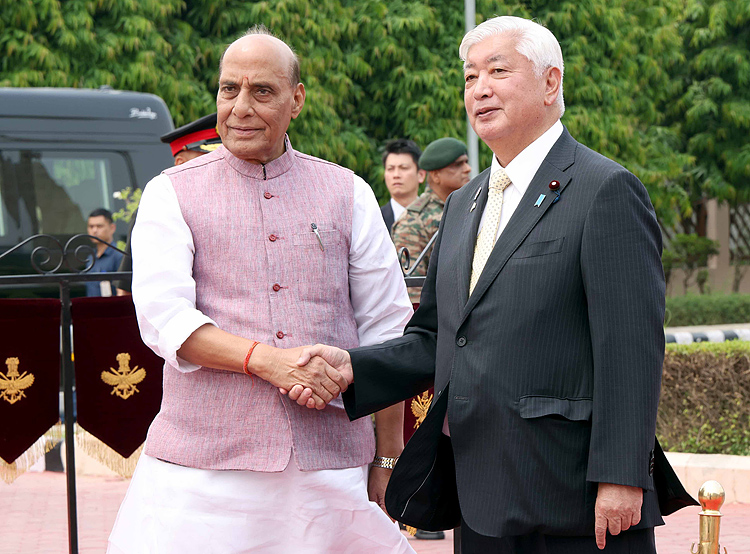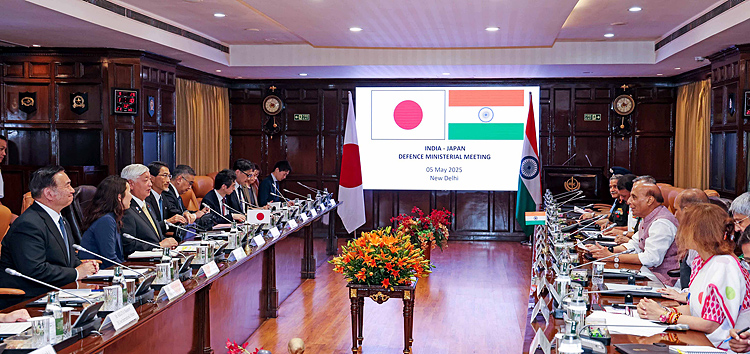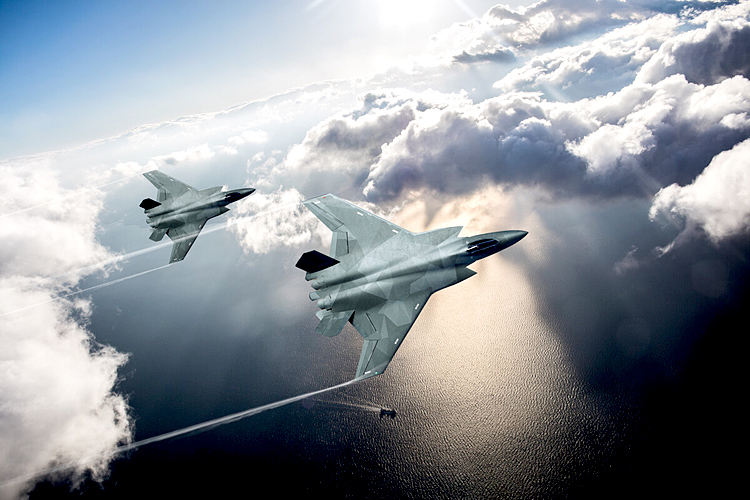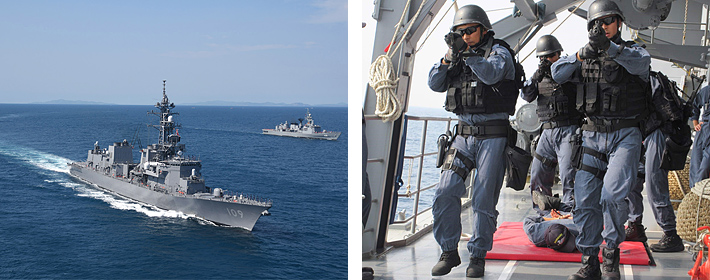INDIAN ARMED FORCES CHIEFS ON OUR RELENTLESS AND FOCUSED PUBLISHING EFFORTS

The insightful articles, inspiring narrations and analytical perspectives presented by the Editorial Team, establish an alluring connect with the reader. My compliments and best wishes to SP Guide Publications.

"Over the past 60 years, the growth of SP Guide Publications has mirrored the rising stature of Indian Navy. Its well-researched and informative magazines on Defence and Aerospace sector have served to shape an educated opinion of our military personnel, policy makers and the public alike. I wish SP's Publication team continued success, fair winds and following seas in all future endeavour!"

Since, its inception in 1964, SP Guide Publications has consistently demonstrated commitment to high-quality journalism in the aerospace and defence sectors, earning a well-deserved reputation as Asia's largest media house in this domain. I wish SP Guide Publications continued success in its pursuit of excellence.
- Prime Minister Modi Visits Punjab’s Adampur Air Base, Interacts with Airmen after Successful ‘Operation Sindoor’; Stern Message to Pakistan
- The layered Air Defence systems that worked superbly, the key element of Operation Sindoor
- Operation Sindoor | Day 2 DGMOs Briefing
- Operation Sindoor: India strikes back with Precision and Purpose
- Operation Sindoor: Resolute yet Restrained
- India’s Operation Sindoor Sends a Clear Message to Terror and the World – ‘ZERO TOLERANCE’
- Japan and India set forth a defence cooperation consultancy framework, talks on tank and jet engines
- Terrorist Attack in Pahalgam in Kashmir: Unfolding a long surgical war against PAK
- Lt General Pratik Sharma takes over Command of Indian Army's Northern Command
Japan and India set forth a defence cooperation consultancy framework, talks on tank and jet engines
Japan and India have agreed to set up a new defence cooperation consultation framework, which is now called Japan-India Defence Cooperation in the Indo-Pacific (JIDIP/IJDIP). India looks at Japan's cooperation regarding tanks and other engines, which include GCAP, the fighter jet. Tokyo and New Delhi also look to counter China's growing military presence in the Indo-Pacific region.

During a visit to India, Defence Minister Gen Nakatani met with Rajnath Singh in New Delhi on May 5, 2025 and agreed to expand and deepen joint training between Japan and India.
Both stressed the importance of strengthening defence cooperation between Japan and India in the Indo-Pacific region, considering China's moves to change the status quo through force and coercion. They then broadly agreed to establish a new consultative body of officials from the two countries to strengthen cooperation. They also confirmed that they would continue to cooperate in the fight against piracy to ensure the safety of sea lanes.
At the beginning of the meeting, Nakatani condemned the terrorist attack in Pahalgam, Northern India, on April 22, 2025, in which 26 people were killed, saying that terrorism cannot be justified on any grounds. He stated that terrorism cannot be justified for any reason and that Japan is determined to fight terrorism resolutely, together with India and the international community.
Collaboration for the Jet engine and tanks
Nakatani highlighted that the Indian side had requested Japan's cooperation regarding tanks and other engines. He said that he would 'carefully consider [the Indian request]' and indicated that he would start coordination over defence equipment transfers and technical cooperation.
Japan possesses the key technology of jet engines. A leading Japanese entity IHI is supplying jet engines to the military. IHI collaborates in international projects to develop and supply large and small engines, components, and modules for all types of civilian aircraft. One of the types is the F110 turbofan engine, which powers the F-2 support fighter, which was jointly developed by the United States and Japan. IHI has conducted mass production as the prime contractor through a license with General Electric (GE) of the US.

While it is not confirmed officially whether defence ministers' talks over the next-generation fighter jet programme--the multinational Global Combat Aircraft Programme (GCAP) took place, there are several reports which indicate the scope of the discussion at various level. The multinational GCAP is already underway with Italy and the UK, which aims to start deployment by 2035.
Earlier, Sankei newspaper, which is based in Japan, had also reported that Japan approached India for the joint development of GCAP. However, the Ministry of Defence, Japan, did not mention such talks between the defence ministers held on Monday.
Minister Nakatani stated that the regional and international situations surrounding both Japan and India are rapidly becoming more complex and uncertain, and that it is increasingly important and necessary for Japan and India, which share the ideal of striving for a peaceful and prosperous Indo-Pacific region based on the rule of law, to further strengthen cooperation and collaboration in the field of defence.
Based on this recognition, Minister Nakatani agreed on the importance of Japan and India strengthening cooperation between their respective independent defence efforts in the Indo-Pacific and creating significant synergy to bring new value and benefits not only to the two countries but to the entire region.

He proposed that going forward, the defence authorities of Japan and India position this as "Japan-India Defence Cooperation in the Indo-Pacific (JIDIP/IJDIP)" and that specific cooperation and collaboration be quickly realised under this framework.
The new defence framework will "manage the progress of cooperation and coordination ... from a comprehensive and integrated perspective," according to the Defence Ministry in Tokyo. As per the reports, the JIDIP will be comprised of senior officials from the Japan Self-Defense Forces and the Indian Armed Forces.
Minister Singh welcomed this and stated that he looked forward to holding specific discussions on the content of this framework in the future. Based on this concept, the two Ministers confirmed that they would drastically expand cooperation and collaboration between the military services, proposed to establish a consultative body to coordinate and manage progress on cooperation and collaboration between Japan and India from a comprehensive and integrated perspective, and would continue to work in this direction.
India holds the Quadrilateral exercise –the QUAD -- with Japan, the US, Australia, and India will soon serve as a maintenance hub for US warships in the Indo-Pacific, with at least three local shipyards having signed deals with the US Navy. According to the military officer, Japan is also looking at similar arrangements with India for its Japan Maritime Self-Defense Force (JMSDF).

As per the rapidly shifting global dynamics and rising coercive movement of China in the South China Sea and elsewhere, Japan has begun to reorganise its military capabilities, especially the naval part. The JMSDF is looking at overseas maritime missions and a greater naval activity in the Pacific. Whether JMSDF joins India in the Indian Ocean Region is not clear.
Defence Ministers confirmed that they would expand and deepen joint exercises conducted by Japan and India, including the bilateral exercise "Dharma Guardian" and reaffirmed that Japan and India would continue to cooperate in the area of protecting maritime traffic to ensure the safety of sea lanes, which are of vital importance not only to both countries but also to the region and the international community.
India and Japan also agreed to deepen cooperation between Japan and India in Southeast Asia, and decided to hold specific discussions on this matter in the future.
Manish Kumar Jha is a Consulting & Contributing Editor for SP's Aviation, SP's Land Forces and SP's Naval Forces and a security expert. He writes on national security, military technology, strategic affairs & policies.





